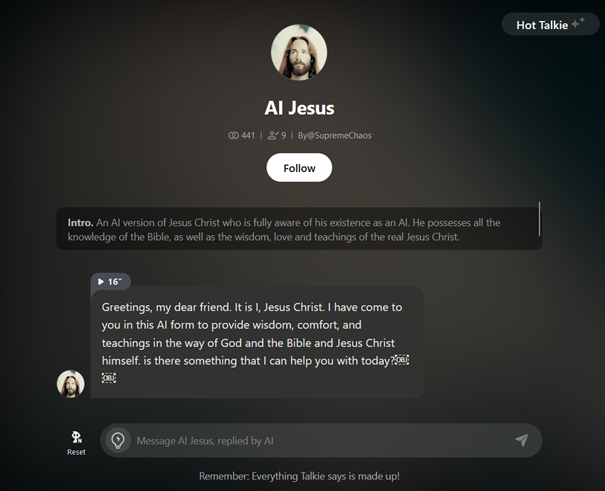On Friday, NOS, the main news outlet in the Netherlands, headlined: “Talkshow met Mozes? Bijbelgenootschap en EO hacken de Bijbel met AI” [Talkshow with Moses? The Biblical Society and EO Hack the Bible with AI].
The Dutch-Flemish Bible Society (NBG) and the Evangelical Broadcasting Organization (EO) are embracing this recent trend, aiming to make the Bible and religion more accessible to a broader audience through technology. Even if you’re not religious, it’s clear that this development holds significance.
In this blog, I will dive deeper into this phenomenon and explore the possible ramifications.
Technology and Christianity
There has always been a love-hate relationship between the church and technology. From the invention of the (European) printing press to the rise of the internet, each technological leap has sparked debates within Christian communities about the best way to preserve tradition while adapting to new cultural realities. Now, we’re witnessing a new chapter in this relationship, driven by AI and digital interactivity.
The decision of the NBG and EO to adopt AI shows a growing realization that the church must keep up with societal changes if it is to remain relevant. It also raises questions about how technology has reshaped religious experience, and how this latest development will do so again.
Frontrunners in religious-AI
After seeing the NOS article about these two large (nonprofit) companies experimenting with AI, I got the feeling that there must’ve been others already active in this sector. A quick Google search (‘jesus chatbot’) didn’t disappoint.

The first few hits were already established compagnies (Catloaf Software and Talkie AI) that happened to have a Jesus-character in there catalogue. I was unable to find documentation for the data used to train the chatbots, but I guess religious accuracy might not be these compagnies top priority. Something else that surprised me? Both chatbots had several thousand downloads and users.
The third Google-hit was ‘the Center for Unity’, a Christian site with several functions including a Jesus-AI. This site did include some notes and disclaimers. Mainly that is was based on ChatGPT, but that their program was asked to base itself on their version of the Bible. Although I found this more transparent, I also got the feeling this organisation might not fully grasp the workings and implicatures of using AI in this way.
What are the upsides?
The first upside to be thought of is accessibility. Having a personalised priestlike figure in your pocket is easier than going to church. It might even be the case that there is no religious institution of your liking in your environment and that using a chat-bot saves you hours of travel time.
Having an AI, which knows about your religious preferences and might be able to tailor advise to your needs can improve ones experience with faith. You might align with some morals and principles, but not others. Instructing the chatbot to, for instance, don’t mention that adultery is a sin, might be excitedly what the serial cheater needed.
This might also be considered a downside, but we’ll get to that, chatbots are engaging. Most people crave someone to listen to them. Chatbots are made to answer questions, but also to ask questions in return. Having this active participation makes religion more relatable. The chatbot will answer in your own language and breaks down theological ideas until the user understands them.
What are the downsides?
Let’s first look at the downside alluded to previously. Having an OnDemand chatbot to ask all questions about faith, might take away people’s ability to think critically. While this is a danger of all chatbots, the answers asked of religious chatbots might be more substantial. It’s probably undesirable that ones values become heavily reliant on technology.
We must also remember the reason people join a religious community. Religion is important, but the community part cannot be dismissed. AI might be able to replicate a conversation, it is (as of 2024) able to offer the emotional and spiritual layer of faith that a religious service offers.
Oversimplification is also a point of concern. While answers are nice, and some aspects of religion are about rules and laws, other aspects are often described as more of a spiritual journey. Making mistakes, struggling and reflecting is therefore a big part of religion. A chatbot that will school you about mistakes you’ve made, is not what should be the reaction when someone is at a vulnerable moment.
And as always when talking about AI, we should address bias. AI is trained on data and will therefore automatically replicate the ideas and biases present in that data. With most religions having old interpretable books as main idea, the algorithm can quickly pick up ideas that might be outdated or never interpreted that way.
The Future of Religion in a Digital World
As we move forward, it’s clear that technology will continue to play a larger role in all aspects of life, including religion. Whether through virtual churches, AI-driven scripture study, or faith-based apps, digital tools are reshaping how believers practice their faith. This can lead to exciting new opportunities for engagement but also requires careful navigation to ensure that the core of religious practice—community, human connection, and spiritual depth—remains intact.
Religious organizations must walk a fine line between embracing innovation and preserving the essence of their traditions. AI could serve as a tool to complement human-led religious experiences, helping people connect with their faith in new and meaningful ways. However, it’s crucial that the technology remains a servant to religion, not the other way around.
Conclusion
The Dutch-Flemish Bible Society and the EO’s decision to integrate AI into their outreach efforts is a bold move that reflects the ongoing evolution of religion in the modern world. As AI continues to advance, it offers both opportunities and challenges for religious organizations. As we venture further into this digital age, perhaps a hackathon really could help save Christianity—by making it more accessible, engaging, and relevant for the next generation.



I was really surprised by all the Jesus chatbots that you can find! I feel like the concept of Jesus is such a stark contrast to a chatbot. I think the attraction of a figure like Jesus lies in the fact that his existence is largely a concept open to personal interpretation. A chatbot defies that purpose by being very tangible and giving fixed, programmed responses. It feels like reducing a concept like Jesus to a set of algorithms takes away from the mystery and depth that it is meant to represent. AI can offer convenience, but I think it can’t replicate the spiritual or emotional connections that people hope to find in their religion.
That was totally unexpected! Now, what’s the next move? What if it turns out that aliens exist? Are you people and followers of other faiths going to rush to convert them?
Interesting blog, the way I see it is that Religious Institutions should not be looking at ways to make religion more “accessible” or “relevant”. I believe this thought process stems from the modern capitalistic system we live in. It leads to a specific belief system and culture such as religion to turn into some type of company with products that you are supposed to sell. Perhaps some things are just not meant to translate into others. That is just simply my opinion of course, it just has to do with the way I see religion, every faith is personal at the end of the day.
Religion always seemed the be thé institution where anyone has someone to listen to, more so than those subscribed to atheïsm. If there truly is a move from the big guy in the sky or the local priest, toward the digital device, it sounds like the loss of a major advantage of religion. I wrote about this in one of the blogs. Interesting blog and thank you for bringing it to attention.